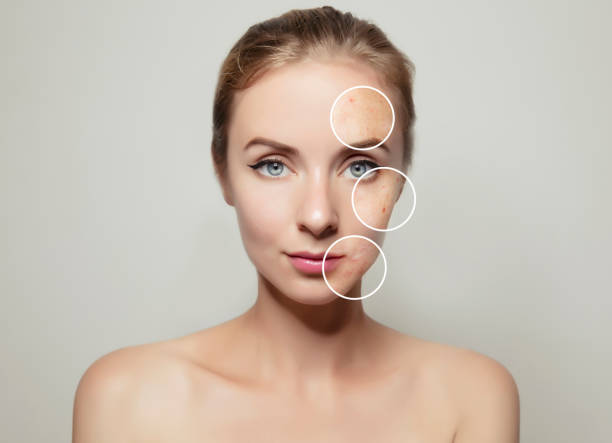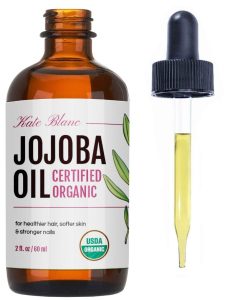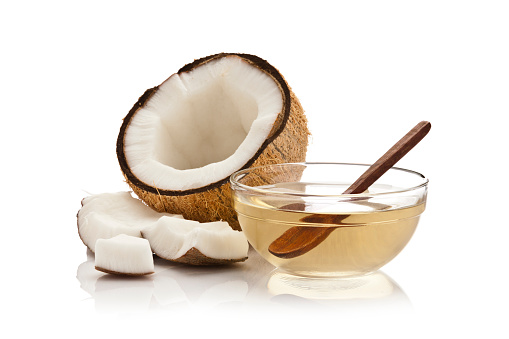Grape seed oil has become a common ingredient in skin products because it’s both effective and affordable. But is grape seed oil the same as jojoba oil? And which one should you use?
Let us decipher the benefits and uses of these two oils in this Jojoba Oil Vs Grapeseed Oil guide that covers the major differences between them.
So, let’s get started!
Contents
- 1 Jojoba Oil Vs Grapeseed Oil: Background
- 2 Jojoba Oil Vs Grapeseed Oil Differences
- 3 Jojoba Oil Vs Grapeseed Oil Benefits
- 4 Jojoba Oil Vs Grapeseed Oil: Which Is Better?
- 5 Can I Mix Jojoba Oil With Grapeseed Oil?
- 6 Jojoba Oil Vs Grapeseed Oil For Hair
- 7 Jojoba Oil Vs Grapeseed Oil For Skin
- 8 Jojoba Oil Vs Grapeseed Oil For Oily And Acne Prone Skin
- 9 Jojoba Oil Vs Grapeseed Oil: Which One Is Better For Face?
- 10 Jojoba Oil Vs Grapeseed Oil – Conclusion
Jojoba Oil Vs Grapeseed Oil: Background
The history and origin of grapeseed oil goes back to Ancient Egypt through Greece, where the seeds were crushed and used for cooking or to treat skin conditions like acne.
Jojoba oil on the other hand is native to North America and has been used for thousands of years by Native Americans as a sacred ingredient in their medicines, skin care products and even in cooking dishes.
But what are these oils exactly?
Grapeseed oil is pressed from the seeds of grapes while jojoba oil is derived from the berries of a shrub-like plant that belongs to the same family as sunflowers.
But they do have their differences and below we’ll be talking about the aspects that will surely fulfill your queries on Jojoba Oil Vs Grapeseed Oil.
Jojoba Oil Vs Grapeseed Oil Differences
As far as the similarities go, grapeseed oil and jojoba oil are both 100% natural oils that don’t contain any chemicals. They are also rich in vitamin E which is why they act as good antioxidant agents on skin.
But there are differences between grape seed oil vs. Jojoba oil when it comes to their composition, texture and characteristics too.
Let’s take a look at some important things you should know about each of these oils below:
1. Texture And Feel
Grapeseed oil is lighter than Jojoba oil and has a non-greasy feeling which makes it perfect for moisturizers.
On the other hand, Jojoba oil is thicker (with a consistency similar to that of sebum) and can leave an oily residue on skin.
So if you’re looking for a lightweight moisturizer, grapeseed oil is the perfect choice. But if you want an oil that can leave your skin feeling soft and smooth all day long, go for Jojoba oil.
Related Video – Grapeseed Oil Vs Jojoba Oil
2. Heat Stability
Another difference between these two oils is their heat tolerance.
Grapeseed oil can withstand very high temperatures thanks to its non-sensitizing properties while jojoba oil has a much lower boiling point which means it starts to break down at lower temperatures (and even melts at very low temperatures).
3. Smell
Both these oils smell really nice when applied on skin. Grapeseed oil has a light fruity scent while Jojoba oil has a slightly nutty smell which will disappear when it gets absorbed into your skin.

4. Purity
Grapeseed oil is refined using chemicals and high heat to remove all impurities from the oil while there are no such processes involved in the production of jojoba oil .
The lack of chemical refining makes grapeseed oil inferior in terms of purity, but the presence of chemicals also means that grapeseed oil contains fewer nutrients than jojoba oil does.
5. Antimicrobial Properties
Grapeseed oil has a mild antimicrobial property because it contains a compound called procyanidin that is an antioxidant and can destroy harmful bacteria.
This makes grapeseed oil the perfect choice for antibacterial products like lip balm, soap and face wash.
But jojoba oil doesn’t have any antimicrobial components which is why you should only use jojoba oil on wounds if they’re already clean and free from infections.
Otherwise your open wound could get exposed to germs in jojoba oil too.
6. Contraindications And Allergies
Grapeseed oil is generally considered safe for topical use but you might experience some minor side effects when using it on sensitive skin (such as dryness, stinging sensation, itchiness, redness of skin etc.).
This is why you should do a patch test before buying grapeseed oil to make sure it doesn’t irritate your skin.
As for jojoba oil , it is considered safe for topical use in adults and children alike but can lead to some allergic reactions in some individuals too.
7. Comedogenicity
Comedogenicity refers to the ability of an ingredient (or combination of ingredients) to clog pores and cause blackheads, whiteheads, acne etc.

Grapeseed oil ranks low on the comedogenic scale which means it is less likely to lead to breakouts while jojoba oil has a very high comedogenic rating which makes it unsuitable for people with acne-prone skin.
8. Emollient Qualities
Both these oils are rich in vitamin E which means they can act as good moisturizers for your skin.
But grapeseed oil offers better emollient properties than jojoba oil does because it contains more linoleic acid , a fatty acid that’s known for its hydrating properties.
9. Occlusivity
Another difference between grapeseed oil and jojoba oil is their occlusive properties.
Grapeseed oil can form a protective barrier on skin which locks the moisture inside your skin whereas jojoba oil doesn’t have this ability.
So if you’re looking for an oil that can seal in moisture, grapeseed oil is the perfect choice but since it often gets absorbed into your skin within 10 minutes or so, you might need another moisturizing step to lock in all that extra moisture.
10. Availability And Price
Grapeseed oil is readily available in the market while jojoba oil can be purchased online or from specialist stores.
Grapeseed oil is generally cheaper than jojoba oil , but you can find good quality grapeseed oil for affordable prices too.
Jojoba oil on the other hand is more expensive, especially if you’re looking for organic, cold pressed grade A oils.
The less chemical refining process used to produce grapeseed oil compared to jojoba oil makes it a better option but there are plenty of benefits associated with using both these oils too so you should do your research before deciding which one to buy.
Jojoba Oil Vs Grapeseed Oil Benefits
Jojoba Oil Top Benefits
Jojoba oil is a liquid wax made up of long chain monounsaturated liquid wax esters and fatty acids.
This liquid wax has been used for decades in the cosmetic, pharmaceutical and aromatherapy industries to nourish and protect skin from external damage, retain moisture, reduce water loss from skin by forming a protective barrier on skin and deliver antioxidant benefits.
Below are some of the top benefits of this oil and this Jojoba Oil Vs Grapeseed Oil guide tries to be as transparent in this description as it can be:
1. Antioxidant Properties
Jojoba oil contains large amounts of vitamin E which makes it an antioxidant powerhouse that can help neutralize free radicals in your skin, reduce wrinkles and fine lines , prevent premature ageing, protect against sun damage , soothe inflammation and irritation caused by acne etc.
2. Moisturizing Properties
You can use jojoba oil as a moisturizer by itself or mix it with other carrier oils to improve their penetration, consistency and results.
3. Anti-inflammatory Properties
In addition to containing antioxidants, jojoba oil has anti-inflammatory properties too which help soothe irritated skin of people with conditions such as psoriasis, dermatitis, etc.
4. Promotes Hair Growth
Jojoba oil contains essential nutrients that can help reduce hair damage and promote growth because it nourishes the roots of your hair from within, making them stronger and thicker over time. Jojoba oil is also responsible for making those locks shiny because it’s a great conditioner.
5. Natural SPF
This oil does not contain SPF so you’ll need to add an external sunscreen when going out in the sun.
But jojoba oil’s anti-inflammatory properties and antioxidant content can help prevent and soothe sunburns and rashes caused by excessive exposure to sunlight.
Grapeseed Oil Top Benefits
Grapeseed oil is a natural substance derived from the seeds of grapes.
It contains linoleic acid which gives it antioxidant properties, vitamin E for anti-aging benefits, compounds that are known to reduce inflammation and prevent free radical damage in skin cells, etc.
Here are some of its top health benefits:
1. Nourishes Skin From Within
Grapeseed oil penetrates deep into your skin, so it doesn’t sit on top like most other oils do.
This deep penetration makes it an ideal moisturizer for dry skin because this oil can work all day long without getting absorbed by your skin over time .
It also helps improve the texture and tone of your skin while preventing future damage due to aging or sun exposure.
2. Prevents Acne
Grapeseed oil contains high amounts of linoleic acid which is known to reduce inflammation and control breakouts.
3. Improves Skin Elasticity
This oil has anti-aging and moisturizing properties, and it softens and hydrates skin naturally by helping your skin retain moisture more effectively.
It can also help improve the elasticity of your skin over time, making it smoother and firmer as you age.
4. Reduces Wrinkles And Fine Lines
As mentioned above, grapeseed oil contains antioxidants such as vitamin E that work as powerful anti-aging agents by protecting against free radical damage in your cells.
This helps remove wrinkles, fine lines and other signs of aging from your skin.
5. Prevents Premature Aging
Grapeseed oil contains large amounts of vitamin E which has been scientifically proven to help reduce the appearance of fine lines and wrinkles on your face by up to 30% in just 90 days.
Vitamin E also works as an anti-inflammatory agent and antioxidant that can help protect against free radical damage and reverse some damage caused by aging, sun exposure or pollutants.
Jojoba Oil Vs Grapeseed Oil: Which Is Better?
Both grapeseed oil and jojoba oil are considered effective natural moisturizers that can nourish your skin from within.
Jojoba oil is an excellent anti-aging agent because it penetrates deep into the dermal layers of your skin to repair damage caused by free radicals or sun exposure.
It also contains antioxidants like vitamin E which help protect against future damage, reduce wrinkles, fine lines, etc.
Grapeseed oil isn’t as potent as jojoba oil in that regard but it’s still a good moisturizer for dry skin types because it can keep your skin well hydrated without making it feel greasy.
It also prevents acne breakouts and makes your locks shinier over time. However, if you have an oily skin type, you’ll probably want to avoid grapeseed oil because it can make your skin oilier and greasier.
So, which is better? Well, that mostly depends on your specific needs and what works best for your skin.
It’s also important to note that each of these oils has its own unique benefits and effects so you should stick with one or the other if possible.
For example, diluted jojoba oil is slightly comedogenic (clogs pores) so grape seed oil would be a better option for those who have acne-prone or sensitive skin types.
On the other hand, jojoba oil does not contain any natural SPF, whereas grapeseed oil does so. This makes grape seed oil preferable if you need protection against sun exposure.
Can I Mix Jojoba Oil With Grapeseed Oil?
As mentioned earlier, jojoba oil penetrates deep into the dermal layers of your skin to repair damage caused by free radicals or sun exposure, whereas grapeseed oil doesn’t.
So, if you mix these two oils together, you’ll be left with a mix that has the moisturizing properties of grapeseed oil but not its potent antioxidant content.
Nevertheless, this mixture can still work as a natural moisturizer for normal to dry skin types.
If you want something more powerful, however, you could also try mixing pure vitamin E oil (usually available in capsule form) with either jojoba or grapeseed oil to create a powerful anti-aging serum that will give your skin all the nourishment it needs from within.
Jojoba Oil Vs Grapeseed Oil For Hair
While grapeseed oil contains antioxidant vitamin E, jojoba oil has two powerful antioxidants of its own: vitamin E and B-carotene.
These help to strengthen your hair follicles over time while preventing breakage, split ends and other problems.
Grapeseed oil is also rich in minerals like copper, iron, potassium, and manganese that can nourish dry hair by strengthening the roots and hydrating the shaft.
It’s noncomedogenic (won’t clog pores) so it can prevent sebum build up on your scalp that causes acne, too.
Grapeseed oil’s high shelf life makes it ideal for air travel where you may not have access to shampoo or conditioner because it does not go rancid easily.
So, which is better? Well, that largely depends on your specific needs.
If you’re trying to nourish damaged hair with essential vitamins and minerals, grapeseed oil may be the better choice because it can provide these nutrients more effectively than jojoba oil.
However, if you have an oily scalp or simply need something with a longer shelf life for traveling purposes, jojoba oil would probably be the superior choice here.
Jojoba Oil Vs Grapeseed Oil For Skin
Both jojoba oil and grapeseed oil are noncomedogenic, so they won’t clog your pores.
However, grapeseed oil is lighter than jojoba oil so it absorbs more quickly into the skin. Jojoba oils, on the other hand, has a thicker consistency but it takes longer to absorb.
So, which is better? Well, that depends on what you’re looking for.
If you have oily skin, then grapeseed oil would be best because it absorbs more quickly without leaving behind an unpleasant greasy feel.
On the other hand, if you have dry or sensitive skin, jojoba oil may be preferable because of its thicker texture which can provide superior hydration benefits.
Jojoba Oil Vs Grapeseed Oil For Oily And Acne Prone Skin
As we mentioned earlier, jojoba oil contains a natural SPF so it will protect your skin from the sun’s harmful UV rays.
Grapeseed oil does not have an SPF so you should only use it at night or when indoors to prevent premature aging and other side effects.
So, which is better? Well, as previously mentioned, jojoba oil has a slightly comedogenic consistency which can clog pores and trigger acne breakouts in those who are sensitive to this effect.
Therefore, grapeseed oil could be preferable if you have oily or acne-prone skin because it doesn’t clog pores or aggravate existing problems.
Jojoba Oil Vs Grapeseed Oil: Which One Is Better For Face?
Both jojoba and grapeseed oil are fantastic for your skin, but which one is better in this Jojoba Oil Vs Grapeseed Oil competition?
As we mentioned earlier, grapeseed oil contains a high amount of vitamin C which can brighten your skin tone and fight off free radicals to combat early signs of aging.
This makes it an ideal choice if you’re looking for facial oils that will give your skin a healthy glow.
Jojoba Oil: Healing Properties
Jojoba oil has healing properties which make it essential for puffy eyes and other skin problems.
It can also help with hydrating dry hair and repairing cracked lips. The high shelf life (up to five years) makes it perfect for long term storage or travel purposes.
Grapeseed Oil: Anti-aging Properties
When it comes to Jojoba Oil Vs Grapeseed Oil, anti aging is something that makes Grapeseed oil a heavier contestant.
Grapeseed oil has anti-aging properties that will fight off wrinkles, age spots and other signs of aging to keep your skin looking young and supple.
It also contains vitamin C which can brighten your complexion, so you have a healthy glow.
So, which is better? Well, it again depends on what you’re looking for.
If you want facial oils with healing properties, then jojoba oil would probably be the superior choice here because grapeseed oil does not contain any special “healing” powers like this one does.
On the other hand, if you want facial oils that will fight off free radicals and give your skin a vibrant glow, then grapeseed oil may be preferable because it has powerful anti-aging properties which can fight off wrinkles and other signs of aging.
Jojoba Oil Vs Grapeseed Oil – Conclusion
All in all, both jojoba oil and grapeseed oil have a lot to offer and this Jojoba Oil Vs Grapeseed Oil might have clarified it well to you.
If you’re looking for facial oils that will give your skin a healthy glow, then grapeseed oil would probably be the superior choice here.
It contains high amounts of vitamin C and has anti-aging properties which will keep your skin feeling young and rejuvenated while preventing early signs of aging.
On the other hand, if you want healing facial oils with unique powers like jojoba’s UV protection, pore cleansing abilities and other special “healing” properties, then you should go with this one instead because grapeseed oil doesn’t have any of these properties.
As long as you know what you’re looking for then it’s pretty clear cut which one is better.
![30 Best Jojoba Oil Shampoo [Reviewed] 30 Best Jojoba Oil Shampoo [Reviewed]](https://theoilvirtue.com/wp-content/uploads/2022/02/J·R·LIGGETTS-All-Natural-Shampoo-Bar-Jojoba-And-Peppermint-300x300.jpg)

![20 Best Jojoba Oil Shave Oil [Reviewed] 20 Best Jojoba Oil Shave Oil [Reviewed]](https://theoilvirtue.com/wp-content/uploads/2022/02/The-Man-Company-100-Natural-Beard-Oil-For-Men-With-Almond-Oil-Thyme-Argan-And-Jojoba-Oil-300x300.jpg)
![15 Best Jojoba Oil Body Oil [Reviewed] 15 Best Jojoba Oil Body Oil [Reviewed]](https://theoilvirtue.com/wp-content/uploads/2022/02/Jojoba-Oil-By-Leven-Rose-Pure-Cold-Pressed-Organic-Unrefined-Moisturizer-For-Skin-Hair-Body-Nails-And-Cuticles-300x300.jpg)
![12 Best Jojoba Carrier Oils [REVIEWED] 12 Best Jojoba Carrier Oils [REVIEWED]](https://theoilvirtue.com/wp-content/uploads/2022/02/Cliganic-USDA-Organic-Jojoba-Oil-100-Pure-Natural-Cold-Pressed-Unrefined-Hexane-Free-Oil-For-Hair-Face-Base-Carrier-Oil-244x300.jpg)

![15 Best Jojoba Oil Hair Oil [REVIEWED] 15 Best Jojoba Oil Hair Oil [REVIEWED]](https://theoilvirtue.com/wp-content/uploads/2022/02/Cliganic-USDA-Organic-Jojoba-Oil-100-Pure-Natural-Cold-Pressed-Unrefined-Hexane-Free-Oil-For-Hair-Face-243x300.jpg)


![10 Best Jojoba Oil Gallon [Reviewed] 10 Best Jojoba Oil Gallon [Reviewed]](https://theoilvirtue.com/wp-content/uploads/2022/02/Cliganic-Jojoba-Oil-Non-GMO-Bulk-Gallon-128oz-100-Pure-Natural-Cold-Pressed-Unrefined-Hexane-Free-Oil-For-Hair-Face-167x300.jpg)
![18 Best Jojoba Oil Soap [Reviewed] 18 Best Jojoba Oil Soap [Reviewed]](https://theoilvirtue.com/wp-content/uploads/2022/02/Cove-Castile-Soap-Unscented-Organic-Argan-Jojoba-And-Hemp-Oils-228x300.jpg)



![12 Best Jojoba Oil Lip Balms [Reviewed] 12 Best Jojoba Oil Lip Balms [Reviewed]](https://theoilvirtue.com/wp-content/uploads/2022/02/Ogee-Sculpte-Lip-Oil-Made-With-100-Organic-Coconut-Oil-Jojoba-Oil-300x300.jpg)

